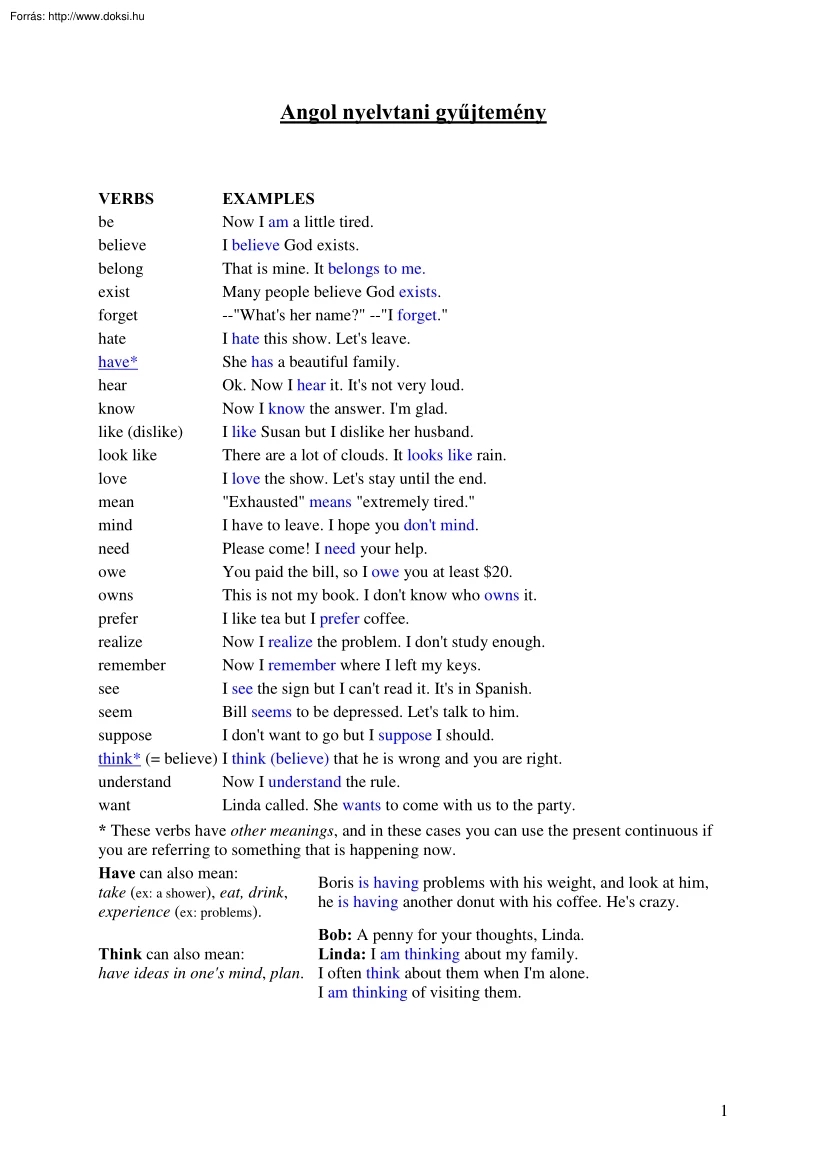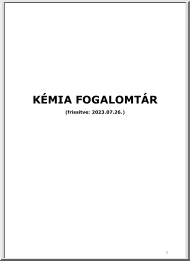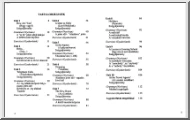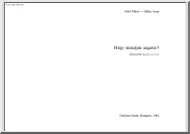A doksi online olvasásához kérlek jelentkezz be!

A doksi online olvasásához kérlek jelentkezz be!
Nincs még értékelés. Legyél Te az első!
Tartalmi kivonat
Angol nyelvtani gyűjtemény VERBS EXAMPLES be Now I am a little tired. believe I believe God exists. belong That is mine. It belongs to me exist Many people believe God exists. forget --"What's her name?" --"I forget." hate I hate this show. Let's leave have* She has a beautiful family. hear Ok. Now I hear it It's not very loud know Now I know the answer. I'm glad like (dislike) I like Susan but I dislike her husband. look like There are a lot of clouds. It looks like rain love I love the show. Let's stay until the end mean "Exhausted" means "extremely tired." mind I have to leave. I hope you don't mind need Please come! I need your help. owe You paid the bill, so I owe you at least $20. owns This is not my book. I don't know who owns it prefer I like tea but I prefer coffee. realize Now I realize the problem. I don't study enough remember Now I remember where I left my keys. see I see the sign but I
can't read it. It's in Spanish seem Bill seems to be depressed. Let's talk to him suppose I don't want to go but I suppose I should. think* (= believe) I think (believe) that he is wrong and you are right. understand Now I understand the rule. want Linda called. She wants to come with us to the party * These verbs have other meanings, and in these cases you can use the present continuous if you are referring to something that is happening now. Have can also mean: Boris is having problems with his weight, and look at him, take (ex: a shower), eat, drink, he is having another donut with his coffee. He's crazy experience (ex: problems). Bob: A penny for your thoughts, Linda. Think can also mean: Linda: I am thinking about my family. have ideas in one's mind, plan. I often think about them when I'm alone I am thinking of visiting them. 1 Do business . good . harm . one's best . somebody a favor . well (= succeed) Make .a decision . a habit of .
a loss . a mistake . an attempt . an effort . an excuse . an exception . an offer . a noise . a profit . a promise . arrangements . love, peace, war . the most of (= take advantage of) 2 Rules for Irregular Spelling of Verb Inflections Verb inflections include any endings added to the base form of the verb. These include -s, -ing, and -ed. Spelling for the majority of verbs is regular, and the inflections are simply added to the base form. For a few verbs, though, the spelling does change, and the rules are outlined below. For more information on irregular verbs and verb tenses, please see the List of Irregular Verbs at this web site. Doubling of Consonants 1. If the base form ends in a single consonant and the preceding vowel is stressed and spelled with only one letter, double the consonant before adding -ing and -ed occur/occurring, swim/swimming, ship/shipping 2. If the preceding vowel is unstressed or spelled with two vowels, do not double the consonant enter/entering,
visit/visiting, develop/developing, dread/dreading, appeal/appealing, shout/shouting 3. If the base form ends in -c, change the -c to -ck panic/panicking, picnic/picnicking 4. There are exceptions with some verbs ending in -l, -m, and -p travel--traveling or travelling program--programing or programming worship--worshiping or worshipping Deletion or Addition of -e 1. If the base form ends in an unpronounced -e, drop the -e before adding -ing and ed inflections create/creating, type/typing, bake/baking 2. For monosyllabic verbs ending in -ye, -oe, or -nge, keep the final -e before -ing, but drop it before -ed 3 dye--dyeing/dyed hoe--hoeing/hoed singe--singeing/singed 3. If the base form ends in -ie or -ee, drop the final -e before -ed die/died, agree/agreed, tie/tied 4. If the verb ends in -s, -z, -x, -sh, and -ch, add -e before the -s ending pass/passes, buzz/buzzes, coax/coaxes, wash/washes, watch/watches Treatment of -y 1. If the base form ends in -y, change the -y to -ie
carry/carries, try/tries 2. If the base form ends in -ed, change the -y to -i carry/carried, try/tried 3. Following a vowel or preceding -ing, the -y remains stay/stayed, toy/toying, try/trying, carry/carrying 4. If the base form ends in -ie, change the -ie to -y before -ing die/dying, lie/lying, tie/tying 4 Irregular Nouns SINGULAR alumnus analysis antenna appendix axis bacterium basis beau bureau child corpus crisis criterion curriculum datum deer diagnosis ellipsis fish focus foot formula fungus genus goose hypothesis index louse man matrix PLURAL alumni analyses antennae/antennas appendices axes bacteria bases beaux bureaux/bureaus children corpora/corpuses crises criteria curricula data deer diagnoses ellipses fish foci/focuses feet formulae/formulas fungi/funguses genera geese hypotheses indices/indexes lice men matrices 5 means medium mouse nebula nucleus oasis ox paralysis parenthesis phenomenon radius series sheep species stimulus stratum synthesis synopsis tableau
thesis tooth vertebra vita woman means media mice nebulae nuclei oases oxen paralyses parentheses phenomena radii series sheep species stimuli strata syntheses synopses tableaux theses teeth vertebrae vitae women 6 Verb Preposition account for accuse (someone) of adapt to add to adjust to agree on (something) agree to (something) agree with (someone) apologize for (something) apologize to (someone) apply for approve of argue with (someone) argue about (something) arrive at ask for become of believe in belong to blame (someone) for (something) blame (something) on (something) borrow from care about care for catch up with (?) come from comment on communicate with compare with complain about compliment (someone) on congratulate on concentrate on consent to consist of convince (someone) of (something) deal with decide between decide on depend on (dis)approve of dream about, of excuse (someone) for explain (something) to 7 feel like forget about forgive (someone) for get along
with get back from get rid of get through with get used to happen to have confidence in have influence over have an opportunity for have patience with have a reason for hear about hear from hear of insist on introduce to invite (someone) to keep for, from keep on laugh about laugh at learn about listen for listen to look at look for look forward to object to participate in pay for plan on prefer to prepare for prevent from provide for provide (someone) with recover from refer to relate to rely on remind (someone) of search for see about send for separate from show up at speak about spend (money) on 8 stop from substitute for subtract from succeed in suspect (someone) of take advantage of take care of talk about talk over talk to thank (someone) for think about think of throw away vote for wait for warn about waste (money) on wish for work for worry about 9 Verb+Particle Combinations (Phrasal Verbs) Verb Preposition ask out call call call call cross do back off on up out
over figure out fill in fill out fill up find get out in get off get on get over give back give up hand in hand out hang up Synonym ask someone to go on a date return a telephone call cancel ask to speak in class make a telephone call draw a line through do again find the solution to a problem complete a sentence by writing in a blank write information in a form (e.g an application form) fill completely with gas, water, coffee, etc. discover information enter a car, a taxi leave a bus, an airplane, a train, a subway, a bicycle enter a bus, an airplane, a train, a subway, a bicycle recover from an illness return something to someone quit doing something or quit trying give homework, tests, papers, etc., to a teacher give something to this person, then that person, then another person, etc. 1. hang on a hanger or a hook; 10 2. end a telephone call keep leave on out look up make pay pick up back up put away put back put put put down off on put
out run into shut off start over take off tear down tear off tear throw up away/out try on turn down turn off turn turn wake on up up write down continue omit look for information in a reference book invent return money to someone lift put something in its usual or proper place return something to its original place stop holding or carrying postpone put clothes on one's body extinguish (stop) a fire, a cigarette, a cigar meet by chance stop a machine or light, turn off start again remove clothes from one's body destroy a building detach, tear along a dotted or perforated line tear into small pieces put in the trash put on clothing to see if it fits decrease the volume stop a machine or a light, shut off begin a machine or a light increase the volume stop sleeping write a note on a piece of paper 11 Verb+Particle+Preposition Combinations (Phrasal Verbs+Prepositions) Verb Particle Preposition Synonym break up with separate from catch on
to understand catch up on discover the latest information catch up with overtake check in on visit briefly check up on examine check out of leave close in on approach come down with catch a disease come up with find cut down on reduce drop in on visit unannounced drop out of stop attending school end up with finish fool around with have fun while wasting time get along with be congenial get away from leave get away with avoid punishment get back from return from a trip get back to return get down to concentrate get through with finish give in to yield give up on quit go in for try grow up in become an adult keep up with maintain the same pace as someone look down on consider oneself superior to look in on visit 12 look up to admire look out for be careful make away with steal pick up on realize put up with endure run out of finish the supply of
something stand up for support tear out of remove a piece of paper from a book or notebook watch out for be careful 13 Conjuctions COORDINATING CONJUNCTIONS CONJUNCTION WHAT IS LINKED SAMPLE SENTENCES and noun phrase+noun phrase We have tickets for the symphony and the opera. but sentence+sentence The orchestra rehearses on Tuesday, but the chorus rehearses on Wednesday. or verb+verb Have you seen or heard the opera by Scott Joplin? so sentence+sentence I wanted to sit in the front of the balcony, so I ordered my tickets early. CORRELATIVE CONJUNCTIONS both.and not onlybut also eitheror neithernor whetheror Remember, correlative conjunctions are always used in pairs. They join similar elements.When joining singular and plural subjects, the subject closest to the verb determines whether the verb is singular or plural. EXAMPLES AND SENTENCES CORRELATIVE CONJUNCTIONS CONJUNCTIONS WHAT IS LINKED SAMPLE SENTENCE both.and subject+subject Both my sister and
my brother play the piano. either.or noun+noun Tonight's program is either Mozart or Beethoven. neither.nor subject+subject Neither the orchestra nor the chorus was able to overcome the terrible acoustics in the church not only.but also sentence+sentence Not only does Sue raise money for the symphony, but she also ushers at all of their concerts. (Return to Main Menu) 14 SUBORDINATING CONJUNCTIONS TIME CAUSE + EFFECT OPPOSITION CONDITION after although if before since though unless when now that even though only if while as whereas whether or not since in order that while even if until because so in case (that) Subordinating conjunctions, (subordinators) are most important in creating subordinating clauses. These adverbs that act like conjunctions are placed at the front of the clause The adverbial clause can come either before or after the main clause. Subordinators are usually a single word, but there are also a number of multi-word subordinators
that function like a single subordinating conjunction. They can be classified according to their use in regard to time, cause and effect, opposition, or condition. Remember, put a comma at the end of the adverbial phrase when it precedes the main clause. EXAMPLES AND SENTENCES SUBORDINATING CONJUNCTIONS CONJUNCTION SAMPLE SENTENCE after We are going out to eat after we finish taking the test. since Since we have lived in Atlanta, we have gone to every exhibit at the High Musuem. while While I was waiting in line for the Matisse Exhibit, I ate my lunch. although Although the line was long and the wait over two hours, the exhibit was well worth it even if Even if you have already bought your ticket, you will still need to wait in line. because I love Matisse's works because he uses color so brilliantly. 15
can't read it. It's in Spanish seem Bill seems to be depressed. Let's talk to him suppose I don't want to go but I suppose I should. think* (= believe) I think (believe) that he is wrong and you are right. understand Now I understand the rule. want Linda called. She wants to come with us to the party * These verbs have other meanings, and in these cases you can use the present continuous if you are referring to something that is happening now. Have can also mean: Boris is having problems with his weight, and look at him, take (ex: a shower), eat, drink, he is having another donut with his coffee. He's crazy experience (ex: problems). Bob: A penny for your thoughts, Linda. Think can also mean: Linda: I am thinking about my family. have ideas in one's mind, plan. I often think about them when I'm alone I am thinking of visiting them. 1 Do business . good . harm . one's best . somebody a favor . well (= succeed) Make .a decision . a habit of .
a loss . a mistake . an attempt . an effort . an excuse . an exception . an offer . a noise . a profit . a promise . arrangements . love, peace, war . the most of (= take advantage of) 2 Rules for Irregular Spelling of Verb Inflections Verb inflections include any endings added to the base form of the verb. These include -s, -ing, and -ed. Spelling for the majority of verbs is regular, and the inflections are simply added to the base form. For a few verbs, though, the spelling does change, and the rules are outlined below. For more information on irregular verbs and verb tenses, please see the List of Irregular Verbs at this web site. Doubling of Consonants 1. If the base form ends in a single consonant and the preceding vowel is stressed and spelled with only one letter, double the consonant before adding -ing and -ed occur/occurring, swim/swimming, ship/shipping 2. If the preceding vowel is unstressed or spelled with two vowels, do not double the consonant enter/entering,
visit/visiting, develop/developing, dread/dreading, appeal/appealing, shout/shouting 3. If the base form ends in -c, change the -c to -ck panic/panicking, picnic/picnicking 4. There are exceptions with some verbs ending in -l, -m, and -p travel--traveling or travelling program--programing or programming worship--worshiping or worshipping Deletion or Addition of -e 1. If the base form ends in an unpronounced -e, drop the -e before adding -ing and ed inflections create/creating, type/typing, bake/baking 2. For monosyllabic verbs ending in -ye, -oe, or -nge, keep the final -e before -ing, but drop it before -ed 3 dye--dyeing/dyed hoe--hoeing/hoed singe--singeing/singed 3. If the base form ends in -ie or -ee, drop the final -e before -ed die/died, agree/agreed, tie/tied 4. If the verb ends in -s, -z, -x, -sh, and -ch, add -e before the -s ending pass/passes, buzz/buzzes, coax/coaxes, wash/washes, watch/watches Treatment of -y 1. If the base form ends in -y, change the -y to -ie
carry/carries, try/tries 2. If the base form ends in -ed, change the -y to -i carry/carried, try/tried 3. Following a vowel or preceding -ing, the -y remains stay/stayed, toy/toying, try/trying, carry/carrying 4. If the base form ends in -ie, change the -ie to -y before -ing die/dying, lie/lying, tie/tying 4 Irregular Nouns SINGULAR alumnus analysis antenna appendix axis bacterium basis beau bureau child corpus crisis criterion curriculum datum deer diagnosis ellipsis fish focus foot formula fungus genus goose hypothesis index louse man matrix PLURAL alumni analyses antennae/antennas appendices axes bacteria bases beaux bureaux/bureaus children corpora/corpuses crises criteria curricula data deer diagnoses ellipses fish foci/focuses feet formulae/formulas fungi/funguses genera geese hypotheses indices/indexes lice men matrices 5 means medium mouse nebula nucleus oasis ox paralysis parenthesis phenomenon radius series sheep species stimulus stratum synthesis synopsis tableau
thesis tooth vertebra vita woman means media mice nebulae nuclei oases oxen paralyses parentheses phenomena radii series sheep species stimuli strata syntheses synopses tableaux theses teeth vertebrae vitae women 6 Verb Preposition account for accuse (someone) of adapt to add to adjust to agree on (something) agree to (something) agree with (someone) apologize for (something) apologize to (someone) apply for approve of argue with (someone) argue about (something) arrive at ask for become of believe in belong to blame (someone) for (something) blame (something) on (something) borrow from care about care for catch up with (?) come from comment on communicate with compare with complain about compliment (someone) on congratulate on concentrate on consent to consist of convince (someone) of (something) deal with decide between decide on depend on (dis)approve of dream about, of excuse (someone) for explain (something) to 7 feel like forget about forgive (someone) for get along
with get back from get rid of get through with get used to happen to have confidence in have influence over have an opportunity for have patience with have a reason for hear about hear from hear of insist on introduce to invite (someone) to keep for, from keep on laugh about laugh at learn about listen for listen to look at look for look forward to object to participate in pay for plan on prefer to prepare for prevent from provide for provide (someone) with recover from refer to relate to rely on remind (someone) of search for see about send for separate from show up at speak about spend (money) on 8 stop from substitute for subtract from succeed in suspect (someone) of take advantage of take care of talk about talk over talk to thank (someone) for think about think of throw away vote for wait for warn about waste (money) on wish for work for worry about 9 Verb+Particle Combinations (Phrasal Verbs) Verb Preposition ask out call call call call cross do back off on up out
over figure out fill in fill out fill up find get out in get off get on get over give back give up hand in hand out hang up Synonym ask someone to go on a date return a telephone call cancel ask to speak in class make a telephone call draw a line through do again find the solution to a problem complete a sentence by writing in a blank write information in a form (e.g an application form) fill completely with gas, water, coffee, etc. discover information enter a car, a taxi leave a bus, an airplane, a train, a subway, a bicycle enter a bus, an airplane, a train, a subway, a bicycle recover from an illness return something to someone quit doing something or quit trying give homework, tests, papers, etc., to a teacher give something to this person, then that person, then another person, etc. 1. hang on a hanger or a hook; 10 2. end a telephone call keep leave on out look up make pay pick up back up put away put back put put put down off on put
out run into shut off start over take off tear down tear off tear throw up away/out try on turn down turn off turn turn wake on up up write down continue omit look for information in a reference book invent return money to someone lift put something in its usual or proper place return something to its original place stop holding or carrying postpone put clothes on one's body extinguish (stop) a fire, a cigarette, a cigar meet by chance stop a machine or light, turn off start again remove clothes from one's body destroy a building detach, tear along a dotted or perforated line tear into small pieces put in the trash put on clothing to see if it fits decrease the volume stop a machine or a light, shut off begin a machine or a light increase the volume stop sleeping write a note on a piece of paper 11 Verb+Particle+Preposition Combinations (Phrasal Verbs+Prepositions) Verb Particle Preposition Synonym break up with separate from catch on
to understand catch up on discover the latest information catch up with overtake check in on visit briefly check up on examine check out of leave close in on approach come down with catch a disease come up with find cut down on reduce drop in on visit unannounced drop out of stop attending school end up with finish fool around with have fun while wasting time get along with be congenial get away from leave get away with avoid punishment get back from return from a trip get back to return get down to concentrate get through with finish give in to yield give up on quit go in for try grow up in become an adult keep up with maintain the same pace as someone look down on consider oneself superior to look in on visit 12 look up to admire look out for be careful make away with steal pick up on realize put up with endure run out of finish the supply of
something stand up for support tear out of remove a piece of paper from a book or notebook watch out for be careful 13 Conjuctions COORDINATING CONJUNCTIONS CONJUNCTION WHAT IS LINKED SAMPLE SENTENCES and noun phrase+noun phrase We have tickets for the symphony and the opera. but sentence+sentence The orchestra rehearses on Tuesday, but the chorus rehearses on Wednesday. or verb+verb Have you seen or heard the opera by Scott Joplin? so sentence+sentence I wanted to sit in the front of the balcony, so I ordered my tickets early. CORRELATIVE CONJUNCTIONS both.and not onlybut also eitheror neithernor whetheror Remember, correlative conjunctions are always used in pairs. They join similar elements.When joining singular and plural subjects, the subject closest to the verb determines whether the verb is singular or plural. EXAMPLES AND SENTENCES CORRELATIVE CONJUNCTIONS CONJUNCTIONS WHAT IS LINKED SAMPLE SENTENCE both.and subject+subject Both my sister and
my brother play the piano. either.or noun+noun Tonight's program is either Mozart or Beethoven. neither.nor subject+subject Neither the orchestra nor the chorus was able to overcome the terrible acoustics in the church not only.but also sentence+sentence Not only does Sue raise money for the symphony, but she also ushers at all of their concerts. (Return to Main Menu) 14 SUBORDINATING CONJUNCTIONS TIME CAUSE + EFFECT OPPOSITION CONDITION after although if before since though unless when now that even though only if while as whereas whether or not since in order that while even if until because so in case (that) Subordinating conjunctions, (subordinators) are most important in creating subordinating clauses. These adverbs that act like conjunctions are placed at the front of the clause The adverbial clause can come either before or after the main clause. Subordinators are usually a single word, but there are also a number of multi-word subordinators
that function like a single subordinating conjunction. They can be classified according to their use in regard to time, cause and effect, opposition, or condition. Remember, put a comma at the end of the adverbial phrase when it precedes the main clause. EXAMPLES AND SENTENCES SUBORDINATING CONJUNCTIONS CONJUNCTION SAMPLE SENTENCE after We are going out to eat after we finish taking the test. since Since we have lived in Atlanta, we have gone to every exhibit at the High Musuem. while While I was waiting in line for the Matisse Exhibit, I ate my lunch. although Although the line was long and the wait over two hours, the exhibit was well worth it even if Even if you have already bought your ticket, you will still need to wait in line. because I love Matisse's works because he uses color so brilliantly. 15




 Útmutatónk teljes körűen bemutatja az angoltanulás minden fortélyát, elejétől a végéig, szinttől függetlenül. Ha elakadsz, ehhez az íráshoz bármikor fordulhatsz, biztosan segítségedre lesz. Egy a fontos: akarnod kell!
Útmutatónk teljes körűen bemutatja az angoltanulás minden fortélyát, elejétől a végéig, szinttől függetlenül. Ha elakadsz, ehhez az íráshoz bármikor fordulhatsz, biztosan segítségedre lesz. Egy a fontos: akarnod kell!